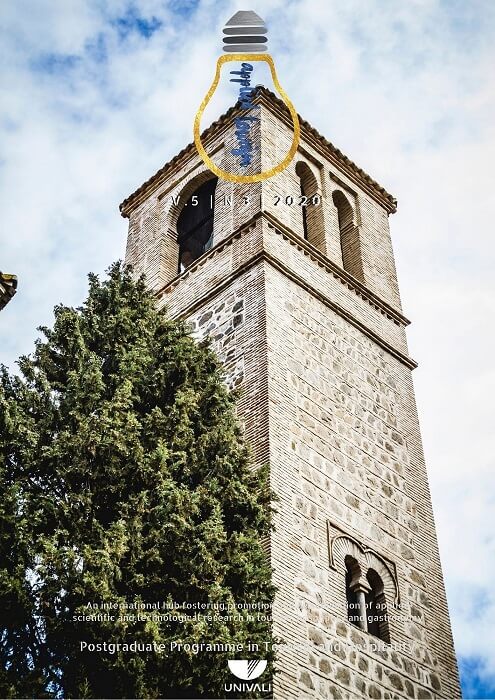The complexity of the term sexual tourism: approach to the project to prevent sexual exploitation of children and adolescents
DOI:
https://doi.org/10.14210/at.v5n3.p20-25Palabras clave:
Tourism, Sexual Exploitation, Public PolicyResumen
In large part, attempts to understand tourism produce inadequate typologies that, in the desire to operationalize the phenomenon, hinder the clarity of the concept and encourage the ill-use of tourist destinations. It is in this way, in the context of globalization that sexual exploitation by tourism arises, associated with the exploitation of under ages in situations of social vulnerability, configure a complex approach to the term sexual tourism. In that framework, this article was elaborated with the objective to analyze the theoretical discussion of the term sexual tourism portrayed in the training courses for multipliers of the Project for the Prevention of the Sexual Exploitation of Children and Adolescents in Tourism of the Ministry of Tourism, in partnership with the Center of Excellence in Tourism of the University of Brasília in the light of the complexity of tourism through the participating subjects - the multipliers. The study adopted the research action and the dialectic method to investigate the level of understanding of the acquired knowledge from these trained actors in the different Brazilian regions, after the institutional training received in the years 2016 to 2017, with the perspective of pointing out possible ways to approach new content that allows the rereading of what may be sex tourism, fundamental to the most responsible practices of tourism professionals.
Citas
BARRETO, M. (2000). Turismo e legado cultural: as possibilidades do planejamento. São Paulo: Papirus.
BRANDÃO, C. R. (1997). Thinking about practice. São Paulo: Edições Loyola.
DEMO, P. (2000). Methodology of scientific knowledge. São Paulo: Atlas.
GASTAL, S.; MOESCH, M. M. (2007). Tourism, public policies and citizenship. São Paulo: ALEPH.
GOODWIN, H. (2005). Responsible tourism and the market. Occasional Paper, no. 4. November, ICTR.
GOODWIN, H. (2009). Ten years of responsible Tourism: an assementin. FONT, X.; GOODWIN, H. (Orgs.) Progress in responsible tourism. v.2, Oxford.
KRIPPENDORF, J. (1989). Sociology of tourism for a new understanding of leisure and travel. Rio de Janeiro: Editora Civilização S.A.
LEAL, M. L. P. (2001). Research on trafficking in women, children and adolescents for the purpose of commercial sexual exploitation in Brazil. Brasília: CECRIA.
MAFFESOLI, M. (2001). On nomadism: postmodern wanderings. Rio de Janeiro: Record.
MINISTRY OF TOURISM (2009). Strategic proposal for the 2014 World Cup tourism organization in Brazil. Brasília.
MOESCH, M. M. (2002). The production of tourist knowledge. São Paulo: Contexto.
MORAES, M. C. (2000). The Emerging Educational Paradigm. São Paulo: Papirus.
OLIVEIRA, A. P. (2000). Tourism and development: planning and organization. (3nd ed.). São Paulo: Atlas.
ROSENO, R. (2006). Brief reflections on the relationship between tourism, childhood and youth in Brazil. Social tourism: dialogues of tourism: a journey of inclusion. Rio de Janeiro: Ministry of Tourism/Brazilian Institute of Municipal Administration.
Descargas
Publicado
Número
Sección
Licencia
Neste termo de responsabilidade certifico(amos) que participei(amos) da elaboração do artigo anexo, desta forma tornando pública a minha(nossa) responsabilidade pelo seu conteúdo. Declaro(amos) que não omitimos quaisquer ligações ou acordos de financiamento entre eu (nós) e entidades e / ou instituições que possam ter interesse na publicação deste artigo. Certifico(amos) que o artigo é original e que o trabalho, no todo ou em parte, ou qualquer outro trabalho com conteúdo substancialmente similar, de minha (nossa) autoria, não foi enviado a outro periódico e não o serão enquanto sua publicação estiver sendo considerada pela Applied Tourism, em qualquer formato (impresso ou eletrônico). Neste termo de consentimento, os autores relacionados dão permissão à Applied Tourism, no caso de aprovação pelo Conselho Editorial dessa, para a publicação do artigo anexo em cópia impressa e/ou eletrônica em edição regular da revista, e para o envio a base de dados.
Você tem o direito de:
- Compartilhar — copiar e redistribuir o material em qualquer suporte ou formato
- Adaptar — remixar, transformar, e criar a partir do material
- para qualquer fim, mesmo que comercial.
- O licenciante não pode revogar estes direitos desde que você respeite os termos da licença.
De acordo com os termos seguintes:
Atribuição — Você deve atribuir o devido crédito, fornecer um link para a licença, e indicar se foram feitas alterações. Você pode fazê-lo de qualquer forma razoável, mas não de uma forma que sugira que o licenciante o apoia ou aprova o seu uso.
CompartilhaIgual — Se você remixar, transformar, ou criar a partir do material, tem de distribuir as suas contribuições ao abrigo da mesma licença que o original.
- Sem restrições adicionais — Você não pode aplicar termos jurídicos ou medidas de caráter tecnológico que restrinjam legalmente outros de fazerem algo que a licença permita.










